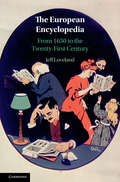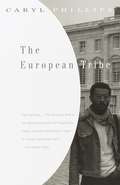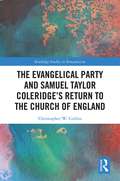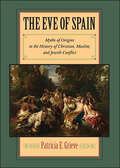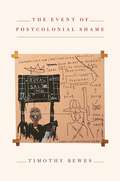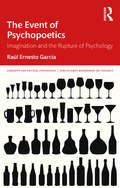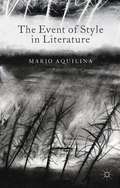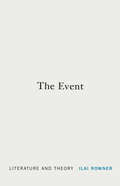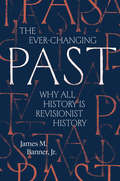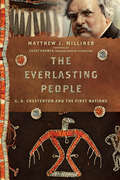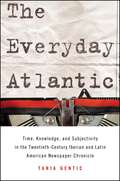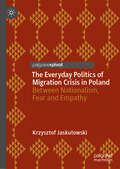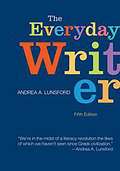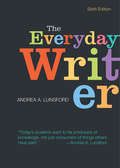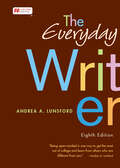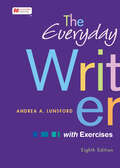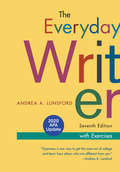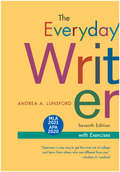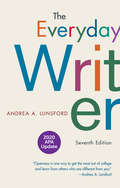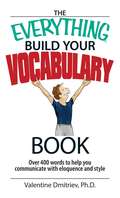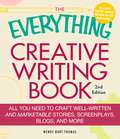- Table View
- List View
The European Encyclopedia: From 1650 to the Twenty-First Century
by Jeff LovelandFirst taking shape during the seventeenth century, the European encyclopedia was an alphabetical book of knowledge. For the next three centuries, printed encyclopedias in the European tradition were an element of culture and peoples' lives, initially just among Europe's educated elite but ultimately through much of the literate world. Organized around themes such as genre, economics, illustration, and publishing, The European Encyclopedia is the first comprehensive survey of encyclopedias to be written in English in more than fifty years. Engaging with printed encyclopedias, now largely extinct and the object of nostalgia, as well as the global phenomenon of Wikipedia, Jeff Loveland brings together encyclopedias from multiple languages (notably English, French, and German, amongst others). This book will be of interest to anyone, from academics in the humanities to non-academic readers, with an interest in encyclopedias and their history.
The European Tribe
by Caryl PhillipsIn this richly descriptive and haunting narrative, Caryl Phillips chronicles a journey through modern-day Europe, his quest guided by a moral compass rather than a map. Seeking personal definition within the parameters of growing up black in Europe, he discovers that the natural loneliness and confusion inherent in long jorneys collides with the bigotry of the "European Tribe"-a global community of whites caught up in an unyielding, Eurocentric history.Phillips deftly illustrates the scenes and characters he encounters, from Casablanca and Costa del Sol to Venice, Amsterdam, Oslo, and Moscow. He ultimately discovers that "Europe is blinded by her past, and does not understand the high price of her churches, art galleries, and history as the prison from which Europeans speak."In the afterword to the Vintage edition, Phillips revisits the Europe he knew as a young man and offers fresh observations.
The Evangelical Party and Samuel Taylor Coleridge’s Return to the Church of England (Routledge Studies in Romanticism)
by Christopher W CorbinIt has long been accepted that when Samuel Taylor Coleridge rejected the Unitarianism of his youth and returned to the Church of England, he did so while accepting a general Christian orthodoxy. Christopher Corbin clarifies Coleridge’s religious identity and argues that while Coleridge’s Christian orthodoxy may have been sui generis, it was closely aligned with moderate Anglican Evangelicalism. Approaching religious identity as a kind of culture that includes distinct forms of language and networks of affiliation in addition to beliefs and practices, this book looks for the distinguishable movements present in Coleridge’s Britain to more precisely locate his religious identity than can be done by appeals to traditional denominational divisions. Coleridge’s search for unity led him to desire and synthesize the "warmth" of heart religion (symbolized as Methodism) with the "light" of rationalism (symbolized as Socinianism), and the evangelicalism in the Church of England, being the most chastened of the movement, offered a fitting place from which this union of warmth and light could emerge. His religious identity not only included many of the defining Anglican Evangelical beliefs, such as an emphasis on original sin and the New Birth, but he also shared common polemical opponents, appropriated evangelical literary genres, developed a spirituality centered on the common evangelical emphases of prayer and introspection, and joined Evangelicals in rejecting baptismal regeneration. When placed in a chronological context, Coleridge’s form of Christian orthodoxy developed in conversation with Anglican Evangelicals; moreover, this relationship with Anglican Evangelicalism likely helped facilitate his return to the Church of England. Corbin not only demonstrates the similarities between Coleridge’s relationship to a form of evangelicalism with which most people have little familiarity, but also offers greater insight into the complexities and tensions of religious identity in late eighteenth and early nineteenth century Britain as a whole.
The Eve of Spain: Myths of Origins in the History of Christian, Muslim, and Jewish Conflict
by Patricia E. GrieveThe Eve of Spain demonstrates how the telling and retelling of one of Spain’s founding myths played a central role in the formation of that country’s national identity. King Roderigo, the last Visigoth king of Spain, rapes (or possibly seduces) La Cava, the daughter of his friend and counselor, Count Julian. In revenge, the count travels to North Africa and conspires with its Berber rulers to send an invading army into Spain. So begins the Muslim conquest and the end of Visigothic rule. A few years later, in Northern Spain, Pelayo initiates a Christian resistance and starts a new line of kings to which the present-day Spanish monarchy traces its roots.Patricia E. Grieve follows the evolution of this story from the Middle Ages into the modern era, as shifts in religious tolerance and cultural acceptance influenced its retelling. She explains how increasing anti-Semitism came to be woven into the tale during the Christian conquest of the peninsula—in the form of traitorous Jewish conspirators. In the sixteenth century, the tale was linked to the looming threat of the Ottoman Turks. The story continued to resonate through the Enlightenment and into modern historiography, revealing the complex interactions of racial and religious conflict and evolving ideas of women’s sexuality.In following the story of La Cava, Rodrigo, and Pelayo, Grieve explains how foundational myths and popular legends articulate struggles for national identity. She explores how myths are developed around few historical facts, how they come to be written into history, and how they are exploited politically, as in the expulsion of the Jews from Spain in 1492 followed by that of the Moriscos in 1609. Finally, Grieve focuses on the misogynistic elements of the story and asks why the fall of Spain is figured as a cautionary tale about a woman’s sexuality.
The Event of Postcolonial Shame (Translation/Transnation #26)
by Timothy BewesIn a postcolonial world, where structures of power, hierarchy, and domination operate on a global scale, writers face an ethical and aesthetic dilemma: How to write without contributing to the inscription of inequality? How to process the colonial past without reverting to a pathology of self-disgust? Can literature ever be free of the shame of the postcolonial epoch--ever be truly postcolonial? As disparities of power seem only to be increasing, such questions are more urgent than ever. In this book, Timothy Bewes argues that shame is a dominant temperament in twentieth-century literature, and the key to understanding the ethics and aesthetics of the contemporary world. Drawing on thinkers such as Jean-Paul Sartre, Frantz Fanon, Theodor Adorno, and Gilles Deleuze, Bewes argues that in literature there is an "event" of shame that brings together these ethical and aesthetic tensions. Reading works by J. M. Coetzee, Joseph Conrad, Nadine Gordimer, V. S. Naipaul, Caryl Phillips, Ngugi wa Thiong'o, and Zoë Wicomb, Bewes presents a startling theory: the practices of postcolonial literature depend upon and repeat the same structures of thought and perception that made colonialism possible in the first place. As long as those structures remain in place, literature and critical thinking will remain steeped in shame. Offering a new mode of postcolonial reading, The Event of Postcolonial Shame demands a literature and a criticism that acknowledge their own ethical deficiency without seeking absolution from it.
The Event of Psychopoetics: Imagination and the Rupture of Psychology (Concepts for Critical Psychology)
by Raúl GarcíaThe Event of Psychopoetics overviews and investigates the notion of psychopoetics, a sociopsychological event that involves re-creative slips and that emerges under certain cultural conditions and power relations in the context of everyday interaction and through certain modes of dialoguing and conversing. This transdisciplinary text takes the reader through the thought processes of Deleuze, Guattari, Agamben, Maffesoli, Foucault, Butler, Haraway, and Braidotti, among others, addressing debates that are integral to the critique of psychology and its devices of subjectivization and normalization. Garcia takes a unique approach by reflecting on how psychopoetics contrasts institutionalized dialogues, while constantly emphasizing the generative and transformative potency of social worlds effectuated in the impetuous play of poetics. The book combines the rigor of academic research with the creative display of ideas that open diverse, suggestive lines of reflection on everyday interlocution and its possibilities of reinvention, modes of social existence, and the relation between subjectivity and the designs of power. A truly unique reading experience, this book is ideal for students, instructors, and researchers in the fields of philosophy, social psychology and sociological thought, discourse studies, literary theory, and cultural analysis.
The Event of Style in Literature
by Mario AquilinaThe Event of Style in Literature brings discussions about the question of style up-to-date by schematising the principal issues relating to the topic through a critical overview of the canon of style studies. It reads the work of Jacques Derrida, Maurice Blanchot, and Hans-Georg Gadamer as groundbreaking and 'eventful' interventions.
The Event: Literature and Theory
by Ilai RownerWhat is an event? From a philosophical perspective, events are irregular occurrences—moments of change and interruption—categorized by human perception, language, and thought. While philosophers have pored over the subject of events extensively in recent years, The Event: Literature and Theory seeks to ground it: What is literature’s approach to the event? How does literature produce and give testimony to events? Ilai Rowner’s study not only revisits some of the most important thinkers of our time, including Maurice Blanchot, Gilles Deleuze, Jacques Derrida, and Martin Heidegger, it also develops a critical approach to literature that questions the meaning of the literary event through examinations of literary works by Marcel Proust, Louis-Ferdinand Céline, and T. S. Eliot. Rowner offers a new method of thinking about the particular characteristics of the event within literary works and defines the creative value of literature as the aspiration toward the un-happening within the happening. In this study the experience of literature—as an act of both writing and reading—becomes the struggle to capture the excessive movement of the event while also revealing the creative energy within that work of literature.
The Ever-Changing Past: Why All History Is Revisionist History
by James M. Banner Jr.An experienced, multi-faceted historian shows how revisionist history is at the heart of creating historical knowledge"A rallying cry in favor of historians who, revisiting past subjects, change their minds. . . . Rewarding reading."—Kirkus Reviews History is not, and has never been, inert, certain, merely factual, and beyond reinterpretation. Taking readers from Thucydides to the origin of the French Revolution to the Civil War and beyond, James M. Banner, Jr. explores what historians do and why they do it. Banner shows why historical knowledge is unlikely ever to be unchanging, why history as a branch of knowledge is always a search for meaning and a constant source of argument, and why history is so essential to individuals&’ awareness of their location in the world and to every group and nation&’s sense of identity and destiny. He explains why all historians are revisionists while they seek to more fully understand the past, and how they always bring their distinct minds, dispositions, perspectives, and purposes to bear on the subjects they study.
The Everlasting People: G. K. Chesterton and the First Nations (Hansen Lectureship Series)
by Matthew J. MillinerFirst Things Book of the Year award What does the cross of Christ have to do with the thunderbird? How might the life and work of Christian writer G. K. Chesterton shed light on our understanding of North American Indigenous art and history? This unexpected connection forms the basis of these discerning reflections by art historian Matthew Milliner. In this fifth volume in the Hansen Lectureship Series, Milliner appeals to Chesterton's life and work—including The Everlasting Man, his neglected poetry, his love for his native England, and his own visits to America—in order to understand and appreciate both Indigenous art and the complex, often tragic history of First Nations peoples, especially in the American Midwest. The Hansen Lectureship series offers accessible and insightful reflections by Wheaton College faculty on the transformative work of the Wade Center authors.
The Everyday Atlantic: Time, Knowledge, and Subjectivity in the Twentieth-Century Iberian and Latin American Newspaper Chronicle (SUNY series in Latin American and Iberian Thought and Culture)
by Tania GenticIn The Everyday Atlantic, Tania Gentic offers a new understanding of the ways in which individuals and communities perceive themselves in the twentieth-century Atlantic world. She grounds her study in first-time comparative readings of daily newspaper texts, written in Spanish, Portuguese, and Catalan. Known as chronicles, these everyday literary writings are a precursor to the blog and reveal the ephemerality of identity as it is represented and received daily. Throughout the text Gentic offers fresh readings of well-known and lesser-known chroniclers (cronistas), including Eugeni d'Ors (Catalonia), Germán Arciniegas (Colombia), Clarice Lispector (Brazil), Carlos Monsiváis (Mexico), and Brazilian blogger Ricardo Noblat.While previous approaches to the Atlantic have focused on geographical crossings by subjects, Gentic highlights the everyday moments of reading and thought in which discourses of nation, postcolonialism, and globalization come into conflict. Critics have often evaluated in isolation how ideology, ethics, affect, and the body inform identity; however, Gentic skillfully combines these approaches to demonstrate how the chronicle exposes everyday representations of self and community.
The Everyday Politics of Migration Crisis in Poland: Between Nationalism, Fear and Empathy
by Krzysztof JaskulowskiThis book explores attitudes towards migrants and refugees from North Africa and the Middle East during the so-called migration crisis in 2015-2016 in Poland. Beginning with an examination of Polish government policy and the discursive construction of refugees in the media, politics and popular culture, it argues that they identified refugees with Muslims, who were deemed to pose a threat to the Polish nation. This analysis establishes the Islamophobic public discourse which is shown to be variously reproduced, negotiated and contested in the nuanced study of Polish attitudes which follows. Drawing on original qualitative research and constructivist theory, the book examines differing stances towards refugees in the context of the lay understanding of the Polish nation and its boundaries. In doing so it demonstrates the influence of discourses that draw on an exclusionary concept of national identity and the potential for them to be mobilised against immigrants. This timely, theory-based case study will provide a valuable resource for students and scholars of Central and Eastern European politics, nationalism, race, migration and refugee studies.
The Everyday Writer
by Andrea A. LunsfordAndrea Lunsfords research shows that students are writing more than ever -- in classrooms, workplaces, and social spaces, in local communities and around the world. "The Everyday Writer," Fifth Edition, is the first tabbed handbook to help the participants in this "literacy revolution" build on the smart decisions they make as social writers -- and use their skills in their academic and professional work. With Andrea Lunsfords trademark attention to rhetorical choice and language, and with new chapters on public writing, critical reading, and understanding how and why to use documentation, "The Everyday Writer" gives today's students the information they need to be effective, ethical writers. New illustrations by graphic artist G. B. Tran make complicated concepts clear and inviting for students.
The Everyday Writer
by Andrea A. Lunsford Christine M. Tardy Paul Kei MatsudaContexts for writing keep changing, and Andrea Lunsford knows that every writer needs to engage with audiences and communicate ideas every day. The Everyday Writer shows novice writers how to navigate rhetorical situations and make effective choices everywhere they write. The illustrations, by Eisner Award nominee GB Tran, offer a high-interest approach to writing processes and encourage students to open and use their handbook. And Andrea’s friendly voice is always front and center, ready to answer any question. With new and expanded coverage of presentations and multimodal projects, integrated advice for writers from all language and educational backgrounds, and help learning the moves that make expert writers credible, The Everyday Writer is the encouraging guide students need to take their writing to the next level.
The Everyday Writer
by Andrea A. LunsfordThe Everyday Writer equips you to make informed writing choices for your courses, your career, and your community while also providing all of the writing resources you need in an engaging and highly-visual handbook.
The Everyday Writer with Exercises
by Andrea A. LunsfordThe Everyday Writer with Exercises equips you to make informed writing choices for your courses, your career, and your community while also providing all of the writing resources you need in an engaging and highly-visual handbook.
The Everyday Writer with Exercises
by Andrea LunsfordWith 2020 APA Update. Empowering and inspiring, Andrea Lunsford offers a handbook for our times. The Everyday Writer with Exercises, Seventh Edition, invites students to think rhetorically, communicate ethically, listen respectfully, experiment with language, and adopt openness as a habit of mind necessary for democracy. The seventh edition introduces new chapters on college expectations and on language and identity as well as substantial new advice for reading and interrogating sources, seeking common ground with opponents, using varieties of English, and being open to new approaches in common academic genres. New student models of rhetorical analysis, researched argument, speech, and translingual narrative invigorate the book. As always, Lunsford’s Top Twenty--now its own tabbed section--serves as a guide for building students’ confidence as editors of their own writing.
The Everyday Writer with Exercises with 2020 APA and 2021 MLA Updates
by Andrea A. LunsfordThis ebook has been updated to provide you with the latest guidance on documenting sources in MLA style and follows the guidelines set forth in the MLA Handbook, 9th edition (April 2021).The Everyday Writer with Exercises, Seventh Edition, invites you to think through the choices you have in any writing situation--in other words, it invites you to think rhetorically. A book for our times, it will also help you communicate ethically, listen respectfully, experiment with language, and adopt openness as a habit of mind. Plenty of student models help you with different kinds of writing, and Lunsford’s Top Twenty serves as a guide for building your confidence as editor of your own work. A easy-to-use practical guide to the power of writers’ language and the power of writers’ choices, The Everyday Writer with Exercises is your tool for making something happen in the classroom--and in the world.
The Everyday Writer: with a 2020 APA Update
by Andrea A. LunsfordEmpowering and inspiring, Andrea Lunsford offers a handbook for our times. The Everyday Writer, Seventh Edition, invites students to think rhetorically, communicate ethically, listen respectfully, experiment with language, and adopt openness as a habit of mind necessary for democracy. The seventh edition introduces new chapters on college expectations and on language and identity as well as substantial new advice for reading and interrogating sources, seeking common ground with opponents, using varieties of English, and being open to new approaches in common academic genres. New student models of rhetorical analysis, researched argument, speech, and translingual narrative invigorate the book. As always, Lunsford’s Top Twenty--now its own tabbed section--serves as a guide for building students’ confidence as editors of their own writing.
The Everything Bible Word Search Book
by Charles TimmermanWord search fans will be able to test their Bible knowledge with this word search collection. Packed with 150 puzzles, this entertaining book mixes Bible passages with the most popular Everything® puzzle, including: Forbidden Fruit; Samson and Delilah; The Proverbs of Solomon; The Road to Damascus; The Good Shepherd; and more. This book is perfect for Bible students looking for a fun way to review the New and Old Testaments or for word search lovers who enjoy challenging themselves with theme puzzles.
The Everything Build Your Vocabulary Book
by Valentine DmitrievWith exercises, puzzles, and games, The Everything Build Your Vocabulary Book helps you to improve your vocabulary and enhance your communication skills. This fun, interactive book includes: Words you need every day Commonly misused words and phrases Medical, scientific, business, and legal terms Interchangeable words Words to use in place of idioms, clichés, and slang. This easy-to-follow book painlessly teaches you the words you need to know to sound composed and professional-today!
The Everything Build Your Vocabulary Book: Over 400 Words to Help You Communicate With Eloquence And Style
by Valentine DmitrievA Simon & Schuster eBook. Simon & Schuster has a great book for every reader.
The Everything Creative Writing Book
by Wendy Burt-ThomasMany people can write. But writing well enough to get published takes hours of practice, the ability to take criticism, and expert advice. Filled with stories and tips from published authors, this easy-to-use guide teaches you the basics of the writing craft. Whether you want to create poems or plays, children's books or online blogs, romance novels or a memoir, you'll learn to write more effectively and creatively. Published author, editor, and PR consultant Wendy Burt-Thomas covers all aspects of writing, including how to:Prepare to write, from planning to research to organizationProperly structure your piece to fit your chosen genre Stay focused during the drafting and editing processesWork with other authorsOvercome writer's blockMarket your writingWhether you're an aspiring or experienced writer, you'll find all you need to spark creativity and get your works in print. With exercises, techniques, samples, and interviews with published writers, The Everything Creative Writing Book, 2nd Edition will turn any dedicated craftsman into a great writer.
The Everything Creative Writing Book, 2nd Edition
by Wendy Burt-ThomasAll you need to craft well-written and marketable stories, screenplays, blogs, and more
The Everything Creative Writing Book: All you need to know to write novels, plays, short stories, screenplays, poems, articles, or blogs
by Wendy Burt-ThomasMany people can write. But writing well enough to get published takes hours of practice, the ability to take criticism, and expert advice. Filled with stories and tips from published authors, this easy-to-use guide teaches you the basics of the writing craft. Whether you want to create poems or plays, children's books or online blogs, romance novels or a memoir, you'll learn to write more effectively and creatively. Published author, editor, and PR consultant Wendy Burt-Thomas covers all aspects of writing, including how to:Prepare to write, from planning to research to organizationProperly structure your piece to fit your chosen genre Stay focused during the drafting and editing processesWork with other authorsOvercome writer's blockMarket your writing
